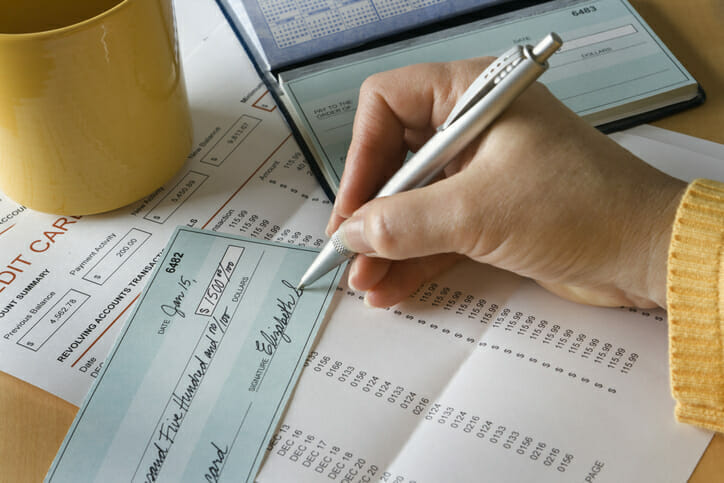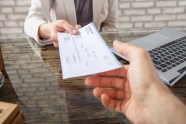Writing checks may not be something you do often. But if you do write a check, it’s important to make sure you have enough money in your bank account to cover it. If you don’t, your bank might charge a returned check fee, also known as a non-sufficient funds fee (NSF). What is a returned check fee? In simple terms, it’s a penalty you pay if you write a check that gets returned to the bank.
If you have financial questions beyond check fees, a financial advisor can help you create a financial plan.
What Does It Mean When a Check Is Returned?
A check is returned when there isn’t enough money in the check writer’s account to cover the amount. For example, say you write a check for $500 to a friend to repay them for a short-term loan they made to you. They take the check to their bank and deposit it into their checking account.
Their bank will then attempt to collect the amount of the check from your bank. Only, you don’t have enough money in your checking account to cover the check you’ve written. The check is then returned to you for non-sufficient funds and your friend is left without that money. You might hear returned checks referred to as “bounced” checks or bad checks.
What Is a Returned Check Fee?
A returned check fee or non-sufficient funds fee is a fee banks can charge to recoup some of the administrative costs of attempting to process check transactions. Returned check fees can also be used to discourage you from writing bad checks.
Who pays a returned check fee? Normally, the check writer is responsible for covering the fee. However, the person who attempts to deposit a bad check can also face penalties.
For instance, say you’re on the receiving end of a bad check. You deposit the check into your bank account in good faith, assuming the amount will be credited to you. You then pay bills and make purchases against the balance.
If the check is returned to the check writer’s bank, your bank will not credit you for the amount. That could put your account balance in the negative if you completed transactions against the check amount. In that case, your bank could charge you one or more overdraft fees.
How Much Do Returned Check Fees Cost?

Returned check fees vary from one bank to another. The average NSF fee is $34, according to the Consumer Financial Protection Bureau. At the upper end, returned check fees are on par with what you may pay for overdraft fees.
It’s possible to find banks that don’t charge returned item fees, though they’re more the exception than the rule. Generally speaking, online banks tend to charge fewer fees overall than traditional banks. That’s because they typically have lower overhead costs and can afford to pass those savings on to their customers.
Being charged multiple returned check or non-sufficient funds fees could quickly put your bank account in the red. If you’re being charged fees while still making purchases or paying bills from the account, you could end up in an overdraft. At that point, your bank may charge overdraft fees as well which could make it harder to work your way out of the financial hole.
What Happens If You Write a Bad Check?
Writing bad checks can result in returned check fees but there may be other, more serious consequences to be aware of.
For starters, your bank could close your checking account if you have a history of bouncing checks. If your account closes with a negative balance, it may be reported to ChexSystems. ChexSystems is a consumer credit reporting bureau that collects information on closed bank accounts.
A negative ChexSystems report could make it more difficult to open a new bank account elsewhere. You may be limited to opening a second chance bank account or relying on reloadable prepaid debit cards to pay bills and manage your money.
If your bank believes that you’ve knowingly written bad checks, you could face criminal charges. Writing bad checks may be a misdemeanor or felony offense, depending on where you live and the scale of the offenses. If convicted of check fraud you could face fines, jail time or imprisonment.
How to Avoid Returned Check Fees
The best way to avoid returned check fees is to keep track of your account balance and transaction history. You can do that by logging in to online or mobile banking on a regular basis to review your account details. Setting up alerts to let you know when your balance is getting low can also help you avoid writing checks that you’re unable to cover.
Should you write a check and then realize you won’t be able to cover it, it’s important to contact your bank right away. They may be able to place a stop payment on the check that would prevent it from being deposited. Keep in mind that your bank may charge a stop-payment fee. For example, a bank might charge $25 or $30 for stop payments, depending on how you file. But that might be preferable to having the check returned altogether.
You could also make a deposit to cover the check or transfer funds from a linked savings account. If you’ve opted into overdraft protection your bank might be able to transfer money for you automatically. That could help you sidestep returned check fees, though you might pay a small overdraft protection transfer fee.
Other Things to Know About Returned Check Fees

Keep in mind that non-sufficient funds fees don’t apply only to checks. You may also be charged one of these fees if you schedule electronic payments or transfers that the bank is unable to process because you don’t have enough money in your account.
If you receive a check from someone else, you may not be charged a returned check fee if it turns out to be bad. You could, however, get hit with one or more overdraft fees if the check is no good. Allowing sufficient time for the check to clear before making any withdrawals against it can ensure that the check has time to clear.
Should You Change Banks to Avoid Returned Check Fees?
If you find yourself paying frequent returned check fees, it may be worth considering a new bank. Some banks charge high fees for returned checks. Meanwhile, others may offer lower fees or better tools to help you avoid them. Online banks, in particular, often have fewer fees because they don’t have the same overhead costs as traditional banks.
Switching to a bank that provides better account alerts or overdraft protection could also help prevent returned check fees. Many banks allow you to set up text or email alerts when your balance is low, giving you time to add funds before a check bounces. Some banks also let you link a savings account to automatically cover shortfalls for a small transfer fee.
Before switching banks, compare account features, fees and protections. If your current bank doesn’t offer ways to avoid or reduce returned check fees, moving to a more customer-friendly bank could save you money and stress in the long run.
Bottom Line
Returned check fees can cost you (and whoever got your bad check). So they’re best avoided whenever possible. Keeping up with your checking account balance and the checks that you’ve written can help you to avoid a scenario where you may end up owing your bank money.
Checking Account Tips
- You could consider talking to your financial advisor about the best ways to simplify bill payments so you can avoid returned check fees. Finding a financial advisor doesn’t have to be hard. SmartAsset’s free tool matches you with vetted financial advisors who serve your area. You can have a free introductory call with your advisor matches to decide which one you feel is right for you. If you’re ready to find an advisor who can help you achieve your financial goals, get started now.
- If you’re interested in opening a new checking account, it’s important to compare the fees you might pay at different banks. Again, online banks may be a more fee-friendly option. It’s possible to find online checking and savings accounts with no monthly maintenance fees, no overdraft fees and no fees for things like paperless statements, domestic wire transfers and online bill payments.
Photo credit: ©iStock.com/Charnchai, ©iStock.com/YinYang, ©iStock.com/AndreyPopov
